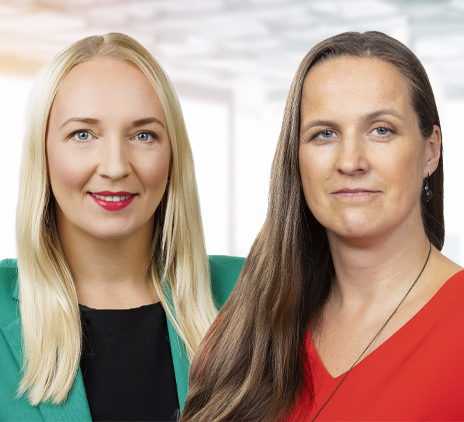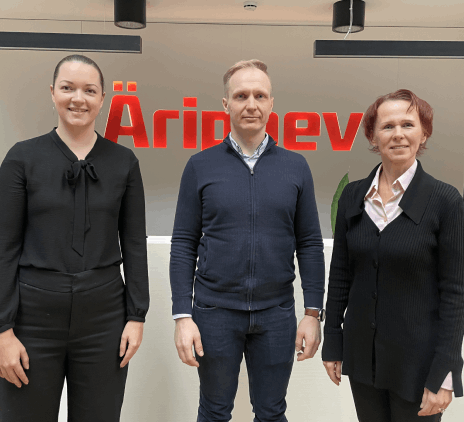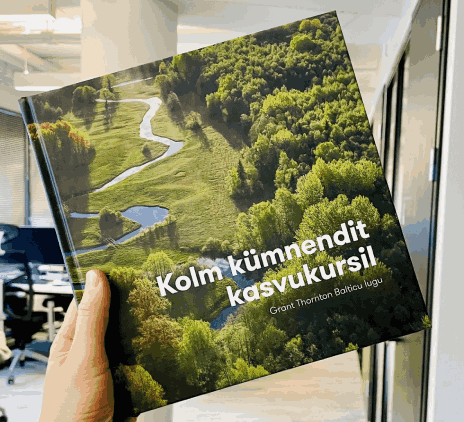-
Other audit services
We help clients with the application and use of foreign financial aid of EU and other funds and help prepare financial reports.
-
Audit calculator
The calculator will answer if the company's sales revenue, assets or number of employees exceed the limit of an inspection or audit.
-
Payroll and related services
We perform payroll accounting for companies whether they employ a few or hundreds of employees.
-
Tax accounting
Grant Thornton Baltic's experienced tax specialists support accountants and offer reasonable and practical solutions.
-
Reporting
We prepare annual reports in a timely manner. We help to prepare management reports and various mandatory reports.
-
Consolidation of financial statements
Our experienced accountants and advisors help you prepare consolidation tables and make the consolidation process more efficient.
-
Consultancy and temporary staff
Our experienced specialists advise on more complex accounting transactions, rectify poor historic accounting, and offer the temporary replacement of an accountant.
-
Outsourced CFO service
Our CFO service is suitable for companies of all sizes and in all industries. We offer services to our clients in the required amount and competences.
-
Assessment of accounting processes
We help companies to implement accounting practices that are in compliance with local and international standards.
-
Accounting services for small businesses
We offer affordable service for small businesses. We help organize processes as smartly and cost-effectively as possible.
-
Cryptocurrency accounting
We keep up with blockchain technology to serve and advise crypto companies. We are supported by a network of colleagues in 130 countries.
-
Trainings and seminars
Our accountants have experience in all matters related to accounting and reporting. We offer our clients professional training according to their needs.

-
Business advisory
We offer legal support to both start-ups and expanding companies, making sure that all legal steps are well thought out in detail.
-
Fintech advisory
Our specialists advise payment institutions, virtual currency service providers and financial institutions.
-
Corporate advisory
We advise on legal, tax and financial matters necessary for better management of the company's legal or organizational structure.
-
Transaction advisory
We provide advice in all aspects of the transaction process.
-
Legal due diligence
We thoroughly analyze the internal documents, legal relations, and business compliance of the company to be merged or acquired.
-
In-house lawyer service
The service is intended for entrepreneurs who are looking for a reliable partner to solve the company's day-to-day legal issues.
-
The contact person service
We offer a contact person service to Estonian companies with a board located abroad.
-
Training
We organize both public trainings and tailor made trainings ordered by clients on current legal and tax issues.

-
Business model or strategy renewal
In order to be successful, every company, regardless of the size of the organization, must have a clear strategy, ie know where the whole team is heading.
-
Marketing and brand strategy; creation and updating of the client management system
We support you in updating your marketing and brand strategy and customer management system, so that you can adapt in this time of rapid changes.
-
Coaching and development support
A good organizational culture is like a trump card for a company. We guide you how to collect trump cards!
-
Digital services
Today, the question is not whether to digitize, but how to do it. We help you develop and implement smart digital solutions.
-
Sales organisation development
Our mission is to improve our customers' business results by choosing the right focuses and providing a clear and systematic path to a solution.
-
Business plan development
A good business plan is a guide and management tool for an entrepreneur, a source of information for financial institutions and potential investors to make financial decisions.
-
Due diligence
We perform due diligence so that investors can get a thorough overview of the company before the planned purchase transaction.
-
Mergers and acquisitions
We provide advice in all aspects of the transaction process.
-
Valuation services
We estimate the company's market value, asset value and other asset groups based on internationally accepted methodology.
-
Forensic expert services
Our experienced, nationally recognized forensic experts provide assessments in the economic and financial field.
-
Business plans and financial forecasts
The lack of planning and control of cash resources is the reason often given for the failure of many businesses. We help you prepare proper forecasts to reduce business risks.
-
Outsourced CFO service
Our CFO service is suitable for companies of all sizes and in all industries. We offer services to our clients in the required amount and competences.
-
Reorganization
Our experienced reorganizers offer ways to overcome the company's economic difficulties and restore liquidity in order to manage sustainably in the future.
-
Restructuring and reorganisation
We offer individual complete solutions for reorganizing the structure of companies.
-
Corporate taxation
We advise on all matters related to corporate taxation.
-
Value added tax and other indirect taxes
We have extensive knowledge in the field of VAT, excise duties and customs, both on the national and international level.
-
International taxation
We advise on foreign tax systems and international tax regulations, including the requirements of cross-border reporting.
-
Transfer pricing
We help plan and document all aspects of a company's transfer pricing strategy.
-
Taxation of transactions
We plan the tax consequences of a company's acquisition, transfer, refinancing, restructuring, and listing of bonds or shares.
-
Taxation of employees in cross-border operations
An employee of an Estonian company abroad and an employee of a foreign company in Estonia - we advise on tax rules.
-
Tax risk audit
We perform a risk audit that helps diagnose and limit tax risks and optimize tax obligations.
-
Representing the client in Tax Board
We prevent tax problems and ensure smooth communication with the Tax and Customs Board.
-
Taxation of private individuals
We advise individuals on personal income taxation issues and, represent the client in communication with the Tax and Customs Board.
-
Pan-Baltic tax system comparison
Our tax specialists have prepared a comparison of the tax systems of the Baltic countries regarding the taxation of companies and individuals.
-
Recruitment services – personnel search
We help fill positions in your company with competent and dedicated employees who help realize the company's strategic goals.
-
Recruitment support services
Support services help to determine whether the candidates match the company's expectations. The most used support services are candidate testing and evaluation.
-
Implementation of human resource management processes
We either assume a full control of the launch of processes related to HR management, or we are a supportive advisory partner for the HR manager.
-
Audit of HR management processes
We map the HR management processes and provide an overview of how to assess the health of the organization from the HR management perspective.
-
HR Documentation and Operating Model Advisory Services work
We support companies in setting up HR documentation and operational processes with a necessary quality.
-
Employee Surveys
We help to carry out goal-oriented and high-quality employee surveys. We analyse the results, make reports, and draw conclusions.
-
HR Management outsourcing
We offer both temporary and permanent/long-term HR manager services to companies.

-
Internal audit
We assist you in performing the internal audit function, performing internal audits and advisory work, evaluating governance, and conducting training.
-
Internal Audit in the Financial Services Sector
We provide internal audit services to financial sector companies. We can support the creation of an internal audit function already when applying for a sectoral activity license.
-
Audit of projects
We conduct audits of projects that have received European Union funds, state aid, foreign aid, or other grants.
-
Prevention of money laundering
We help to prepare a money laundering risk assessment and efficient anti-money laundering procedures, conduct internal audits and training.
-
Risk assessment and risk management
We advise you on conducting a risk assessment and setting up a risk management system.
-
Custom tasks
At the request of the client, we perform audits, inspections and analyzes with a specific purpose and scope.
-
External Quality Assessment of the Internal Audit Activity
We conduct an external evaluation of the quality of the internal audit or provide independent assurance on the self-assessment.
-
Whistleblowing and reporting misconduct
We can help build the whistleblowing system, from implementation, internal repairs and staff training to the creation of a reporting channel and case management.
-
Sustainability advisory
We help solve issues related to the environment, social capital, employees, business model and good management practices.
-
Sustainability audit
Our auditors review and certify sustainability reports in accordance with international standards.
-
Sustainable finance
We help investors to analyze the environmental issues, social responsibility and good management practices of the company of interest.
-
Sustainable tax
Our international tax specialists define the concept of sustainable tax behavior and provide services related to sustainable tax behavior.
-
Digital strategy
We help assess the digital maturity of your organization, create a strategy that matches your needs and capabilities, and develop key metrics.
-
Intelligent automation
We aid you in determining your business’ needs and opportunities, as well as model the business processes to provide the best user experience and efficiency.
-
Business Intelligence
Our team of experienced business analysts will help you get a grip on your data by mapping and structuring all the data available.
-
Cybersecurity
A proactive cyber strategy delivers you peace of mind, allowing you to focus on realising your company’s growth potential.
-
Innovation as a Service
On average, one in four projects fails and one in two needs changes. We help manage the innovation of your company's digital solutions!

Estonian entrepreneurs will develop an opportunity to grow significantly only if they are able to expand to foreign markets, says Kuldar Väärsi, the CEO of defence contractor Milrem Robotics. Väärsi knows what he is talking about, as Milrem has subsidiaries in the US and Sweden and has its sights set on a number of countries in Southeast Asia and the Middle East.
“The Estonian market is not sufficient in the defence industry and thus we defined our market as global right from the outset. But all of the bureaucracy involved in expanding across borders is something that Estonian companies are not used to – be it legal procedures or tax accounting. The fines for flouting the rules or misinterpreting them can be pretty high,” says Väärsi.
A given company usually does not employ legal and tax specialists who know the tax systems of different countries and know exactly what the first steps are when founding a subsidiary in the US or another European country. Milrem lacked such competence as well. “As I believe it is less costly to make the necessary preparations properly and thoroughly at the start rather than discovering later that something important was missed, we turned to our advisers at Grant Thornton Baltic straight away,” Väärsi says about his first steps taken toward entering markets abroad.
Milrem’s goals were different in the US and Sweden. In the US, the focus was placed on establishing sales potential on that market while in Sweden the objective was to draw on skill sets that could not be found in Estonia. “We have seen very rapid growth in Estonia over the last year, we have over 90 people working for us, 50 of whom are engineers. But for certain larger projects we found that we had deficits when it came to certain skill sets - there just were not engineers with those experience. Sweden had them, though, and so it was a good idea in the sense of clarity of the corporate structure and recruitment to establish a subsidiary,” says Väärsi about his goals in entering the respective markets.
A local agent or a subsidiary?
The company’s business model and goals largely determined the way in which it starts operating on the new market: does it pay to find an agent who sells the products and services of the Estonian company locally or is it a better idea to establish a subsidiary.
The head of tax advisory at Grant Thornton Baltic, Kristjan Järve, talks about the options in more detail. “One option is to find a partner or agent in the foreign market who represents the Estonian company and sells its products. But if they want to secure a solid foothold in that country and the destination market is very important for Estonian companies, it is wise to establish a subsidiary. Taxation and the complexity thereof depends on which option to choose.”
Järve explains. “The local agent/partner model is the simplest option when entering a new market abroad. This way minimises the red tape associated with tax accounting and founding a company abroad. In the sense of business strategy as well, this is a safe bet. After all, we do not know how things will go on the new market, and thus it is easier to establish a foothold using a cooperation partner,” he says.
But the agent/partner model involves one important nuance. If the partner becomes very dependent on the Estonian company – perhaps it intermediates only the Estonian company’s goods and services or is closely tied to marketing and marketing conditions and negotiations, the Estonian company may be viewed in the eyes of international taxation rules as having a permanent place of business in that foreign country. In short, the Estonian company is considered to have a separate business in that company, which means accounting and income tax obligations and in certain cases, VAT obligations as well. “The conventional tax bureaucracy arises,” Järve says in summing up the consequences of a permanent place of business.
Friendly and not so friendly tax officials
If the plan is to set up a subsidiary, one should analyse right at the outset what the reasonable and conservative method for transfer pricing - distributing profits between related persons – is so that it would be acceptable to the local country and Estonian tax authority. Järve notes that it should also be remembered that tax authorities in different countries have different practices in dealing with customers. “For example, southern European tax authorities are more aggressive in regard to permanent place of business and use different interpretations than other European countries’ tax authorities. I praise the Dutch and Finnish tax boards, for example, they are very keen on providing good service and happy to answer questions. The most complicated situation is in countries where the taxman has taken the position that they are not a service organisation and it is hard to get practical information out of them. In that case one has to rely on local advisors,” says Järve.
Väärsi emphasises that when choosing a consultant in Estonia, it is important to look at whether the advisor has a local partner in given foreign country or is represented in some other manner, as knowing the conditions “on the ground” is important. Järve also says that international network is an important keyword, to allow Estonian clients to be supported when expanding across international borders. “Even the broadest-minded Estonian tax advisor who has good knowledge of tax law and specific knowledge of the destination country is not able to provide consultation on an expansion to a foreign country. One should turn to local consultants to double-check the local rules,” he emphasises.
Once the Estonian company has made the selection and is establishing a foothold in a new country through an agent or subsidiary, administrative support functions should be considered. “How will administration take place, how will IT solutions be provided, how will HR management work. One should not expect it all to be done from Estonia. For example, labour law regulations vary widely and thus a decision has to be made whether to hire a local personnel manager or contract for that skill set from a local advisory partner. The expense on consultation will work out cheaper than finding out later that something has not been done or done improperly,” says Väärsi.
Summing up the topic, Estonian companies should remember two proverbs when plotting a move to new markets abroad. One of them says: measure nine times, cut once. The other is: the bold wolf eats well at the end of the day!
Related services:
Tax Mergers and acquisitions Legal due diligence Transaction advisory
Interested in our services? Contact us and let's discuss the opportunities.










